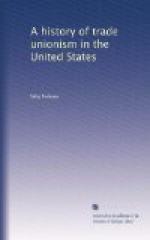The new situation was brought home to the brotherhoods in the course of several wage arbitration cases in which they figured.[62] The outcome taught them that the public will give them only limited support in their efforts to maintain their real income at the old high level compared with other classes of workers.
A most important case arose from a “concerted movement” in 1912[63] of the engineers and firemen on the 52 Eastern roads for higher wages. Two separate arbitration boards were appointed. The engineers’ board consisted of seven members, one each for the interests involved and five representing the public. The award was unsatisfactory to the engineers, first, because of the meager raise in wages and, second, because it contained a strong plea to Congress and the country to have all wages of all railway employes fixed by a government commission, which implied a restriction of the right to strike. The award in the firemen’s case, which was decided practically simultaneously with the engineers’, failed to satisfy either side.
The conductors and trainmen on the Eastern roads were next to move “in concert” for increased wages. The roads refused and the brotherhoods decided by a good majority to quit work. This threatened strike occasioned the passage of the so-called Newlands bill as an amendment to the Erdman Act, with increased powers to the government in mediation and with more specified conditions relative to the work of the arbitration boards chosen for each occasion. Whereupon both sides agreed to submit to arbitration.
The award allowed an increase in wages of seven percent, or less than one-half of that demanded, but disallowed a plea made by the men for uniformity of the wage scales East and West, and denied the demanded time and a half for overtime. The men accepted but the decision added to their growing opposition to the principle of arbitration.
Another arbitration case, in 1914, involving the engineers and firemen on the Western roads led the brotherhoods to come out openly against arbitration. The award was signed only by the representatives on the board of the employers and the public. A characteristic aftermath of this case was an attack made by the unions upon one of the “neutrals” on the board. His impartiality was questioned because of his relations with several concerns which owned large amounts of railroad securities. Therefore, when in 1916 the four brotherhoods together demanded the eight-hour day, they categorically refused to consider arbitration.[64] The evolution to a fighting unionism had become complete.
While the brotherhoods of the train service personnel were thus shifting their tactics, they kept drawing nearer to the position held by the other unions in the railway service. These had rarely had the good fortune to bask in the sunshine of their employers’ approval and “recognition.” Some railways, of the more liberal sort, made agreements with the machinists and with the other shop unions. On the whole, however, the hold of these organizations upon their industry was of a precarious sort.




